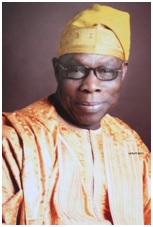President Obasanjo’s role as Cervical Cancer-Free Nigeria Campaign Ambassador will accelerate broad-scale vaccination of Nigerians against HPV, the virus that causes cervical cancer
SAN FRANCISCO, CA / ACCESSWIRE / June 16, 2021 / Global Oncology, a U.S.-based non-profit organization announces the appointment of Former Nigerian President Olusegun Obasanjo as Presidential Ambassador of the Cervical Cancer-Free Nigeria campaign (www.CervicalCancerFree.org). The grassroots campaign is mobilizing communities across Nigeria to improve access to and uptake of the HPV vaccine, which will help achieve the WHO’s target of a cervical-cancer free future – the first global commitment to eliminate a cancer.
“Women are the cornerstone of Nigerian society – we must commit to their health and well-being. I am thus honored to partner with Global Oncology to advance the Cervical Cancer-Free Nigeria campaign,” said President Obasanjo. “I am confident that Nigeria can lead the charge in achieving the WHO goal of vaccinating at least 90% of girls by 2030. We must raise awareness and end this disease once and for all.”
Cervical cancer is the second-most common cancer in Nigeria and three Nigerian women die of the disease every day. These deaths are preventable with the HPV vaccine, scheduled for introduction in Nigeria in 2021. Previous research has clearly shown that the success of a vaccine rollout – whether it is the HPV vaccine or COVID-19 vaccine – depends on the general public being made aware of vaccine safety, efficacy and availability. To address this critical need, Global Oncology and its partner organizations have developed innovative educational tools and advocacy strategies to ensure that there is a high level of awareness, readiness and uptake of the HPV vaccine when it is rolled out nationally.
Dr. Ami S. Bhatt, Co-founder of Global Oncology and Associate Professor of Medicine and Genetics at Stanford University, said, “We are so fortunate that President Obasanjo has so passionately committed to improve the lives of women and girls across Nigeria as a part of the Cervical Cancer-Free Nigeria campaign. He will no doubt accelerate progress and ensure the success of this life-saving effort.”
Other distinguished Nigerian Ambassadors of the CCFN campaign include Otunba Abimbola Ogunbanjo, President of the National Council of The Nigerian Stock Exchange; Senator LanreTejuoso, Pro-Chancellor of the University of Lagos and President of the Legislative Initiative for Sustainable Development; Dr. Zainab ShinkafiBagudu, First Lady of Kebbi State and Founder and CEO of Medicaid Cancer Foundation; Mr. Patrick Doyle, Broadcaster and producer; Ms. Rekiya Ibrahim Attah, Actress; Ms. TounSonaiya, Radio broadcaster and CEO of WFM 91.7; Ms. Tinu Eze, Teacher and mentor; Ms. Amarachi Nwosu, Creative director and cultural consultant; Ms. Karo Omu, Founder of Sanitary Aid Initiative; and Ms. Folashade Domingo, Health advocate.
About Global Oncology
Global Oncology (http://globalonc.org) was founded by Drs. Ami Bhatt (Stanford University) (bio) and Franklin Huang (University of California, San Francisco) (bio) in 2012 and is based in the San Francisco, California, USA. They seek to bring the best in cancer care and education to underserved communities worldwide.
CONTACT:
Phil Garrity, GO Program Director
phil@globalonc.org
m: 617-899-9963
Mr. Kehinde Akinyemi, Special Assistant on Media to President Obasanjo
trustmaninogun@gmail.com
SOURCE: Global Oncology, Inc.

